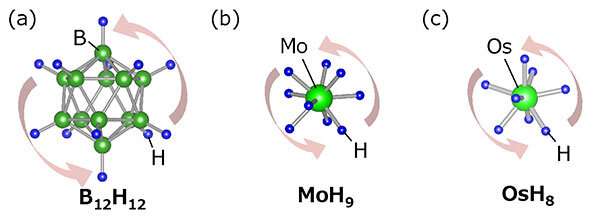Phys.org May 13, 2020
Solid-state ionic conductors’ superior ionic conductivities require high temperature to activate the rotation of polyanions, which conversely means low conductivities at room temperature. Researchers in Japan were able to reduce the activation temperature by using transition metal hydride complexes as a new class of rotatable polyanions, wherein hydrogen is the sole ligand species, covalently binding to single transition metals. The rotation of transition metal hydride complexes only requires displacements of highly mobile hydrogen and can therefore be expected to occur with low activation energy. The mechanism is quite general and would be useful in lowering the temperature required to activate the rotation of polyanions. This may positively contribute towards finding compositions that are amenable to room-temperature superionic conductors…read more. TECHNICAL ARTICLE

Figure 1:Typical polyanions found in solids. (a) B12H122-, (b) MoH93-, and (c) OsH82-. Credit: Shigeyuki Takagi